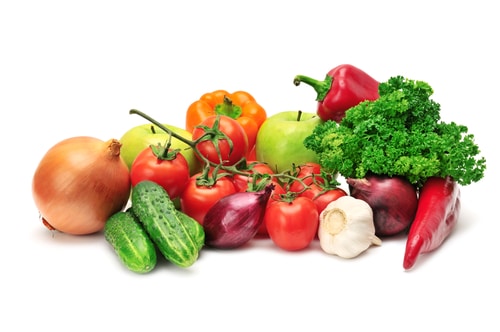 There are lots of good reasons to eat fruits and vegetables. They’re a good source of vitamins, minerals, and heart-healthy fiber – not to mention a healthy source of phytochemicals, compounds that give veggies their color and the ability to reduce inflammation and protect cells against free radical damage. That’s a good thing when it comes to staying healthy from a physical standpoint. But can eating them actually make you happier and improve your sense of well-being too? That’s what a new study published in the journal Social Indicators Research suggests. It found a link between fruit and veggie consumption and an improved sense of well-being.
There are lots of good reasons to eat fruits and vegetables. They’re a good source of vitamins, minerals, and heart-healthy fiber – not to mention a healthy source of phytochemicals, compounds that give veggies their color and the ability to reduce inflammation and protect cells against free radical damage. That’s a good thing when it comes to staying healthy from a physical standpoint. But can eating them actually make you happier and improve your sense of well-being too? That’s what a new study published in the journal Social Indicators Research suggests. It found a link between fruit and veggie consumption and an improved sense of well-being.
Eat Veggies – Be Happy?
Ask most people and they’ll say they’re happier eating a piece of chocolate cake than an order of broccoli – but munching on the broccoli could lift your spirits more in the long run.
When researchers looked at the eating habits of 80,000 British men and women, they found that the mental outlook of these British residents improved as the number of servings of fruits and vegetables they ate daily went up. The optimal number? Based on this study the mental health benefits of veggies and fruits are greatest when you eat around seven servings a day. That’s a total of almost 18 ounces of fruits and vegetables a day. Needless to say, most people fall short of that goal.
Why is There a Link between Vegetables and Fruits and Mental Well-Being?
As of yet, no one has an explanation for these findings, and it’s too early to say whether there’s a true cause and effect. Do people eat lots of fruits and vegetables lead a healthier lifestyle in general that accounts for their greater sense of well-being? Researchers emphasize that more research is needed to confirm these findings. One possible explanation is that green, leafy vegetables are a rich source of folate, a type of B vitamin. Some fruits like berries and melons also have significant amounts of this B-vitamin. Research has liked low levels of folate with an increased risk for depression.
Other research shows that eating a whole food diet that emphasizes fruits, vegetables, whole grains, and fish reduces the risk for depression and anxiety while eating a typical Western diet increases the risk for depression by 50%. In animals, diet influences a protein called brain-derived neurotrophic factor, or BDNF, which has been linked with mood disorders. It’s also possible that some of the phytochemicals in fruits and vegetables have an impact on brain neurotransmitters that affect mood.
This might also be explained by what people who eat fruits and vegetables eat less of. They’re less likely to consume trans-fats, which have been linked with a greater risk for depression, and eat a diet high in sugar, another mood-altering substance according to some research.
The Take-Home Message?
Fruits and veggies have multiple health benefits that are too good to pass up. Aim for seven servings of produce a day. That might sound challenging but not if you incorporate vegetables and fruits into every meal. Start the day off with berries sprinkled on your cereal or a smoothie made with yogurt, berries, and kale. The taste of the berries will hide the kale taste. Eat a colorful salad with lunch and replace the starches you eat at dinner with vegetables. When you eat a snack, make it an apple, a fruit parfait or kale chips instead of a cookie. You’ll be surprised to discover it’s not so hard to get the veggies and fruits your body needs.
References:
Medscape.com “Whole Diet May Ward Off Depression and Anxiety”
Progress in Neuro-Psychopharmacology and Biological Psychiatry, August 2009: vol 33: pp 972-977.
Nutraingredients.com. “Study Backs 7-a-Day for Happiness and Mental Well-Being”

